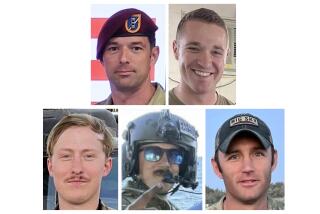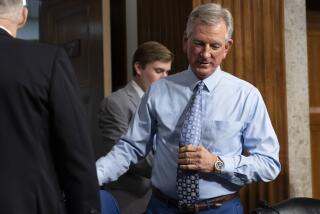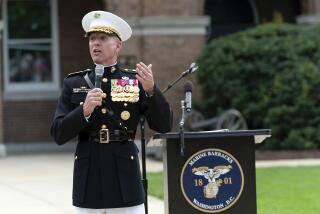Frederick C. Weyand dies at 93; last U.S. commander in Vietnam
Frederick C. Weyand, the last commander of U.S. military operations in the Vietnam War and a former Army chief of staff, has died. He was 93.
Weyand died Wednesday of natural causes at the Kahala Nui retirement residence in Honolulu, his stepdaughter Laurie Foster said.
In 2006, Weyand was identified as the American general who in 1967 confidentially told two reporters about his doubts regarding U.S. involvement in Vietnam.
According to former CBS News correspondent Murray Fromson, Weyand said the war was “unwinnable.”
Fromson, in a 2006 New York Times opinion article, said Weyand talked to him and the New York Times’ R.W. Apple Jr., who wrote a 1967 story headlined “Vietnam: the Signs of Stalemate,” which quoted an unnamed senior American general.
Fromson said Weyand agreed to be identified in 2006 after the death the previous year of Gen. William Westmoreland, who commanded the U.S. forces in Vietnam.
“In 1967 when I was a CBS News correspondent in Vietnam, I met an American general at a cocktail party in Saigon,” Fromson wrote. “He whispered to me, ‘Westy just doesn’t get it. The war is unwinnable. We’ve reached a stalemate, and we should find a dignified way out.’ ”
Weyand oversaw withdrawal of U.S. military forces from South Vietnam before becoming the Army’s chief of staff in 1974.
He retired from active service in 1976.
Frederick Carlton Weyand was born Sept. 15, 1916, in Arbuckle, northwest of Sacramento. His father was the police chief in Berkeley.
Weyand graduated from UC Berkeley in 1939, the year after he received an ROTC commission as a second lieutenant in the Army.
During World War II, Weyand was an intelligence officer, serving in India, China and Burma. He commanded an infantry battalion in the Korean War.
In 1964, Weyand assumed command of the 25th Infantry Division in Hawaii and took it to Vietnam.
His military honors and decorations include the Distinguished Service Cross, Silver Star and Legion of Merit.
“He was a wonderful leader, a marvelous leader, but what he had was this amazing quality to reassure,” said retired Gen. David Bramlett, who was a second lieutenant with the 25th Infantry Division when he first met Weyand in Hawaii in the 1960s.
Survivors include Weyand’s wife, Mary; three children; and four stepchildren. His first wife, Arline Langhart Weyand, died in 2001.
More to Read
Start your day right
Sign up for Essential California for the L.A. Times biggest news, features and recommendations in your inbox six days a week.
You may occasionally receive promotional content from the Los Angeles Times.






